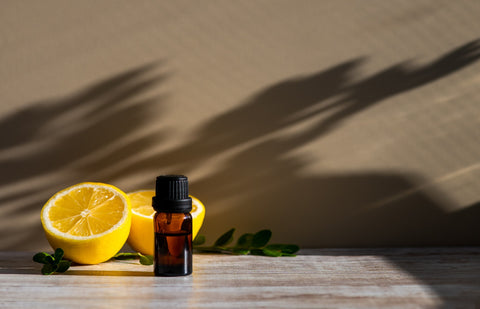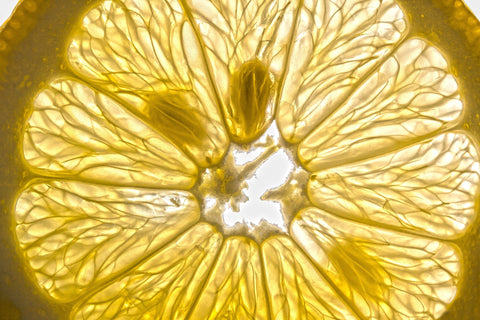Lemon oil is a natural product that not only impresses with its invigorating scent, but also with a wealth of positive properties. Lemon oil, extracted from the peel of sun-kissed citrus fruits, is a true all-rounder when it comes to health and well-being.
In this article, we would like to tell you more about its fascinating effects. You will also learn about its many uses and get tips on how to make lemon oil yourself. Stay tuned and let's explore the world of this versatile natural product together, which should be in every medicine cabinet and every household.
How is lemon oil produced?
Lemon oil is a true gift from nature and, like orange oil , is known for its refreshing and citrusy aroma. It comes from the sunny slopes where lemon trees thrive in abundance. This essential oil is extracted from the peel of the lemon , a fruit that has been valued for centuries for its health benefits and refreshing scent .
The process of oil extraction is a work of art in itself. By cold pressing the lemon peel, the essential oil is slowly extracted, preserving the purity and essence of the lemon in its natural form.
Another method of extracting lemon oil is through steam distillation of lemon peels. This process requires evaporation of the oil from the peels and subsequent condensation to extract the pure lemon essential oil.

Both methods guarantee not only the preservation of the lively and pure aromas, but also the conservation of all the valuable ingredients that make lemon oil such a sought-after product. Free from any additives, lemon oil stands for unadulterated naturalness and purity. The power and energy of the lemon is reflected in every bottle of this golden oil, ready to enrich your life in a variety of applications.
Lemon essential oil: effects & properties
The effects of lemon oil are as varied as the fruit itself. Of particular note are its excellent antiseptic and purifying properties. Lemon oil contains high concentrations of D-limonene , a natural component known for its ability to effectively fight germs and bacteria . These properties make it an ideal natural cleaning agent, capable of disinfecting surfaces and purifying the air of harmful microorganisms.
In addition to its cleansing benefits , lemon oil is also known for its positive effects on mood and general well-being . Its fresh and invigorating scent has a stimulating effect on the central nervous system, which can help to lift mood and reduce stress. Ingredients in lemon oil interact with the body in ways that can improve concentration and provide a feeling of freshness and energy.

It is often used in aromatherapy to promote mental clarity and create an atmosphere of purity and freshness.
Thus , lemon oil is not only a powerful natural cleanser , but also an effective natural remedy for promoting mental well-being , making it an indispensable ingredient in the natural home medicine cabinet .
Lemon essential oil: uses & effects
Lemon oil is a true all-rounder and has a wide range of applications in everyday life. Its versatile uses range from aromatherapy to household cleaning and skin care, making it an indispensable component in every household. You can use the essential oil for the following applications:
- Lemon oil effect on the psyche: In aromatherapy , lemon oil is valued for its mood-enhancing and refreshing properties . A few drops in a diffuser can purify the air in a room and create an invigorating atmosphere. Lemon oil also helps to clear the mind and increase concentration.
- Household cleaning: Lemon oil is an excellent natural cleaning agent . It can be used as an additive in homemade cleaners to disinfect surfaces and leave a fresh, clean scent . A few drops on a sponge or cloth can work wonders to remove stubborn stains and make kitchen appliances shine.
- Skin care: Thanks to its antiseptic properties , lemon oil is also popular in skin care . In diluted form, it can help treat blemishes and refine the skin's texture. However, lemon oil is photosensitizing, so the skin should not be exposed to direct sunlight after application.
- Lemon oil for baking and cooking: Lemon oil offers a variety of flavoring options in the kitchen: It gives salad dressings, marinades and sauces a fresh citrus note. It can be used in baked goods such as cakes and muffins instead of lemon peel or juice . Lemon oil also enriches desserts such as ice cream or puddings. A drop in water, tea or cocktails also provides a refreshing taste. In all of these applications, economical dosing is important because the oil is very concentrated.

- Integration into your daily lifestyle: Lemon oil is easy to integrate into your daily routine. A few drops in your bath water will provide an invigorating and refreshing bathing experience. In the kitchen, lemon oil can be used to clean cutting boards . It can also be used in homemade room sprays to create a fresh and clean scent. or act as a scented laundry spray .
As you have probably already noticed, lemon oil offers a wealth of possibilities to enrich and beautify everyday life in a natural way and is therefore a valuable companion for a healthy and harmonious home.
Make your own lemon oil: step-by-step instructions
Making lemon oil is easier than you think and requires only a few ingredients. But remember that this is not an essential oil, which is obtained by steam distillation or cold pressing. Its taste is therefore less intense than that of an essential oil and is best used to refine salads and other dishes. Here's how to make your own lemon oil:
Step 1: Prepare ingredients
- Fresh, untreated lemons.
- A neutral carrier oil such as jojoba oil, almond oil or olive oil.
- A clean glass container with a lid.
- A fine sieve or cheesecloth.
Once you have all the ingredients ready, you can start the manufacturing process.
Step 2: Prepare lemon peels
First, the lemons must be washed and dried thoroughly. Now, using a zester or a fine grater, remove the peel from the lemons. Make sure to only use the yellow layer of the peel, as the white mesocarp is bitter . This is exactly what you want to prevent. After all, who wants the fresh aroma to be spoiled by an unpleasant bitter note.
Step 3: Mix lemon peel and oil
Now fill the lemon peels into the glass jar and add enough carrier oil to completely cover the grated peels . Once you've done this, you need to close the jar tightly.
Step 4: Let it brew
Now you need a little patience. In order for the carrier oil to absorb the aroma of the essential oils, the mixture should be left in a cool, dark place for about two weeks . For a perfect result, we recommend shaking the container a little every day.
Step 5: Filter the oil
After two weeks, filter the oil through a fine sieve or cheesecloth to remove any lemon peel residue.
Step 6: Storage
Finally, you can pour the filtered oil into a clean, dark glass bottle. Store the oil in a cool, dark place to maximize its shelf life.
Now you can use the lemon oil in its most natural form whenever you want, either to refine salad dressings or other dishes. The shelf life of the homemade lemon oil is about six months . However, you should avoid exposing the oil to direct sunlight or high temperatures, as this would have a negative effect on the aroma and taste of the oil.
Buy lemon oil: Not all oil is the same
If you start looking for lemon oil, you may find yourself overwhelmed by the huge range of products available. Simply blindly buying the next best product is not a good idea. Even if all manufacturers label their products with "lemon oil", the content is guaranteed not to always satisfy you.
The differences in quality are like night and day . That's why we recommend that you consider the following points when buying lemon oil:
- Purity and quality: Make sure the lemon oil is 100% pure . This ensures that it does not contain any additives or fillers.
- Origin: Find out about the origin of the oil. Lemon oils from regions with ideal growing conditions are often of better quality. Products with information about their origin are also more trustworthy.
- Organic certification: If possible, choose organic lemon oil . This guarantees that no harmful chemicals or pesticides were used during cultivation and it is in line with your sustainable values.
- Extraction method: Find out how the oil was extracted. Cold pressing or steam distillation are gentle methods that preserve the quality of the oil. Products that use these methods are of higher quality.

- Transparency: Look for information about the production and quality control of the lemon oil. Trustworthy manufacturers provide this information on their products or websites.
- Packaging: Pay attention to the packaging of the lemon oil. It should be stored in a dark, opaque glass container to protect it from light and oxidation, which could affect its quality.
- Price: Unfortunately, quality has its price. Be careful of cheap lemon oils, as they can often be of inferior quality. It is better to invest in a high-quality product . Because it is not only healthier due to the natural ingredients, but also has a distinctive aroma. Since it has not been diluted, products like these are also more economical and you save money in the long run.
- Customer reviews: Read customer reviews and testimonials to find out how other buyers felt about the product. This can give you additional insight into the quality.
At Emma Grün, we have made it our main daily task to meet all quality criteria when manufacturing our sustainable products. Discover the freshness and purity with Emma Grün's lemon oil - your key to a more natural and healthier lifestyle. Our lemon oil, carefully extracted from organically grown lemons, is a symbol of quality and sustainability.
Why Emma Green Organic Lemon Oil?
- 100% purity and organic quality: We guarantee a pure and undiluted experience. Our organic certification confirms that you are receiving a product without harmful additives.
- Cold pressed for the highest quality: Our lemon oil is obtained by cold pressing to preserve all the vital essences and aromas of the lemon.
- Versatile use: Our organic lemon oil is highly concentrated and certified as a food product, making it your absolute all-rounder in the kitchen. From drinks to flavoring dishes - our lemon oil is as versatile as your life.
- Environmentally friendly and sustainable: True to our values of local sourcing and waste reduction, our oil is produced and packaged sustainably.
Immerse yourself in the world of Emma Grün and experience how our lemon oil can enrich your everyday life. What are you waiting for? Take the first step towards a healthier, more environmentally conscious lifestyle with Emma Grün and find out how much power of nature is contained in our essential oils!
Conclusion: Use the variety of lemon oil in everyday life
Lemon oil is a true powerhouse of nature that can enrich our everyday lives in many ways. From its impressive antiseptic and purifying properties that make it an effective and natural cleanser, to its ability to lift our mood and promote well-being, lemon oil offers a wealth of benefits.
The uses of lemon oil in aromatherapy, household cleaning, skin care and food flavoring demonstrate its versatility and make it an indispensable helper in every household. Furthermore, the ease of making lemon oil at home allows everyone to incorporate the freshness and purity of this wonderful oil into their daily life.
Frequently Asked Questions (FAQ)
Can lemon oil help with digestion?
Yes, lemon oil can aid digestion when diluted and applied to the skin or inhaled.
Is lemon oil safe for skin?
Yes, lemon oil is safe for skin when diluted. However, be aware of its photosensitive effect on skin and wear sunscreen.
How do you store lemon oil properly?
Store lemon oil in a cool, dark place and close the bottle tightly to ensure shelf life.
Are there any contraindications to using lemon oil?
People with sensitive skin or sun allergies should use lemon oil with caution. Pregnant and breastfeeding women should consult their doctor before use.
Can lemon oil relieve headaches?
Yes, lemon oil can help with headaches and migraines when diluted and applied to the temples.
Sources
- Smith, A. (2022). The benefits of lemon oil in aromatherapy. Healthline.
- National Association for Holistic Aromatherapy. (2021). Essential Oil Safety Information. NEAR.
- Tisserand, R., & Young, R. (2014). Essential Oil Safety: A Guide for Health Care Professionals. Churchill Livingstone.
- University of Maryland Medical Center. (2021). Aromatherapy.
- Johnson, L. (2018). Citrus limon essential oil: Chemical composition, antioxidant and antimicrobial activities, and its applications - A review. Natural Product Communications.
- European Medicines Agency. (2020). Herbal medicinal products: assessments of quality and safety.





